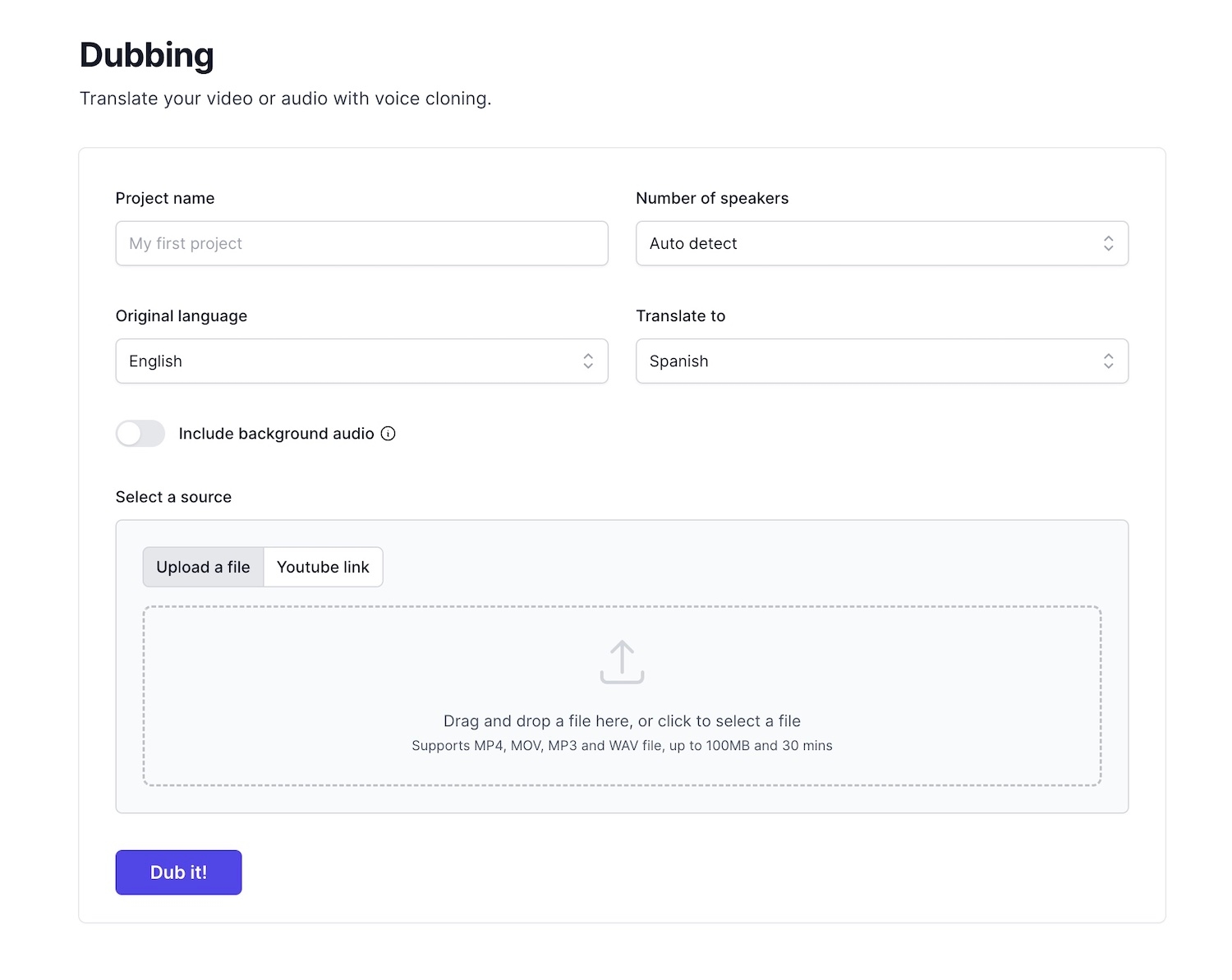Latin to English Video Converter
Break language barriers and reach a wider audience with dubbed content, effortlessly conveying your message to a global viewership.!
- 📚Ancient Text Analysis
Scholars and researchers studying ancient Roman texts, inscriptions, or manuscripts may need to convert Latin to English to understand the context and meaning of the text, which can be crucial in their field of study.
- 📖Language Learning
Students learning Latin as a foreign language may want to convert Latin subtitles or audio to English to improve their comprehension and get a better grasp of the language's grammar and vocabulary.
- 🏯Cultural Preservation
Museums, cultural institutions, or historical societies may need to convert Latin audio or video descriptions of artifacts, exhibits, or historical events to English to make them accessible to a broader audience and preserve cultural heritage.
Everything you need to dub your content
Dub your content with AI-powered translation, voice cloning, text-to-speech and much more at your fingertips.
- Translate content to 30+ languages
- Translate and dub your content and reach a global audience with ease.
- Multi-speaker support
- Support up to 10 speakers at once with automatic speaker detection.
- Voice clone
- Cloning any voice and maintaining brand identity across diverse markets.
- Transcript, subtitles and audio source files
- Access to translated transcript, subtitle and audio source files for your custom editing needs.
Tip tips on choosing the best Latin to English Video Converter
Selecting the right tool ensures accurate translation, high-quality output, and maximum audience engagement and understanding.
- When translating Latin to English, be aware that Latin often uses the subjunctive mood, which can change the tone of the sentence. For example, 'Vellem ire Romam' (I would like to go to Rome) should be translated to 'I would like to go to Rome' instead of 'I want to go to Rome'.
- Latin has many irregular verb forms, so make sure to double-check verb conjugations. For instance, the verb 'amo' (I love) becomes 'amamus' (we love), but 'amemus' (we should love) is the correct subjunctive form.
- Latin often uses ablative absolute constructions, which can be tricky to translate. For example, 'Urbe capita, Caesar triumphavit' (With the city having been captured, Caesar triumphed) should be translated to 'After capturing the city, Caesar triumphed'.
- When dealing with Latin names and titles, ensure they are translated correctly. For instance, 'Marcus Tullius Cicero' should be translated to 'Mark Tully Cicero', not 'Marcus Tullius Cicero' (keeping the Latin name).
- Pay attention to Latin idiomatic expressions, which may not have direct English equivalents. For example, 'Per se' (by itself) is often used to mean 'naturally' or 'of course', but the literal translation 'by itself' may not convey the intended meaning.
Dub your video with 3 easy steps.
Create high-quality dubbed audio or video in a few clicks.
- 1. Upload fileEasily upload audio and video file or enter a YouTube url to start.
- 2. Instant dubbingLet AI translate and dub your content to the desired language.
- 3. Download assetsDownload transcripts, audio clips and final dubbed audio or video file.

Loved by creators worldwide.
Don't just take our word for it, see what our customers have to say!
I was needing to translate audio with a natural sounding speaker but it was hard to find a good AI program that didn't sound like a robot. Dub AI sounds extremely natural!
Konaruhi
The voice clone is unbelievable. My audience actually thought it was me speaking Japanese in the video.
Viktor H.
Oh wow. My feedback is good!!! That was a noisy recording that the person made driving a car with a standard shift. It came out really clear. Really!!
Peggy G.
I'd like to say that I've tried a lot of AI dubbing software and yours is CLEARLY the best. Yours is doing exactly what I want, simple and quick.
@gumytutoriels
Amazing product! It has saved us so much time to translate our marketing videos to different languages.
Tom R.
I have many friends who speak Chinese. I run a youtube channel giving philosophy lectures in English. My friends have been asking me to translate my videos into Chinese so they can enjoy them as well. Dub AI was the perfect tool for this purpose!
@TranscendentPhilosophy
